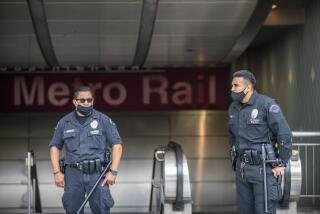Takeover Urged If Toll Road Agencies Resist Merger
Orange County’s toll road agencies, under fire for spending nearly $1 million on legal fees, should be the targets of a hostile takeover unless they agree to merge with the county’s other transportation panels, a key county transportation official said Monday.
Such questions about the toll road agencies’ legal costs and unusual travel spending could undermine efforts to seek voter approval of a countywide sales tax for highway and transit projects in November or in June, 1990, said lawyer Dana W. Reed, who is the at-large public member of the Orange County Transportation Commission.
The Joaquin Hills and Eastern/Foothill Transportation Corridor agencies are overseeing design and construction of three toll roads planned in south Orange County.
“We must seriously consider consolidating the (corridor agencies’) activities with other Orange County transportation providers, regardless of whether or not (they) are willing to cooperate,” Reed told fellow commissioners Monday in Santa Ana.
Reed’s comments reflected the continuing power struggle between the commission and the corridor agencies over control of decision-making on major transportation projects, at a time when many such projects are being planned and funded in Orange County.
The agencies last year rejected a proposed merger with other transportation organizations.
Questions were raised publicly last week about the agencies having racked up nearly $1 million in legal fees, which were paid mostly to the politically influential Los Angeles-based law firm of Nossaman Guthner Knox & Elliott during the last 2 1/2 years.
Also, several thousand dollars in recent travel expenses have drawn criticism from Board of Supervisors Chairman Thomas F. Riley, who is also chairman of both the Orange County Transportation Commission and the San Joaquin Hills agency board.
Those legal and travel expenses have been vigorously defended by John Meyer, executive director for both toll road agencies, which share the same office and staff.
Meyer also said Monday that he stands by the agencies’ rejection of the proposed merger on the ground that it could jeopardize financing for the toll roads, which are expected to open in the mid-1990s.
“We don’t want to do anything to create a level of uncertainty about our finance plan,” Meyer said.
The toll road agencies have raised more than $100 million from developer fees. A countywide super-agency created through a merger would be dominated by cities in the northern county but would control the developers’ funds--which may be used legally only for the three toll road corridors in the south county, Meyer said.
Tustin Mayor pro Tem Richard B. Edgar, who is a member of the Foothill/Eastern road board, as well as a member of the county transportation commission, took strong exception to Reed’s comments Monday.
During the commission meeting, Edgar said it is “premature” to pressure the toll road agencies to merge with other boards and commissions, because a study of the potential economic benefits is incomplete.
“I violently object to what he (Reed) said,” Edgar added after the meeting. “I don’t think that consolidation (merger) is going to be advantageous.”
The toll road agencies were created by state legislation and by joint-powers agreements between the county and the cities along each of the toll road routes. Edgar predicted that any attempt to force a merger would fail legally, because the cities involved would not approve.
Toll road officials last year rejected merger discussions, saying that consolidation with other panels and commissions would complicate the agencies’ efforts to sell revenue bonds needed to help pay for building toll roads.
In an interview Friday, attorney Gregory W. Sanders, a member of the Nossaman law firm, accused Stanley T. Oftelie, executive director of the county transportation commission, of prompting Riley aide Mark Goodman into questioning spending by the toll road agencies.
Sanders also said Oftelie has been upset with the toll road agencies since they pushed through legislation in Sacramento that authorized toll collections in the county.
According to Sanders, Oftelie opposed the legislation behind the scenes while supporting it in public statements.
On Monday, Oftelie--who has been promoting a proposal now under study to merge all of the county’s transportation agencies--said he briefly discussed the toll road agencies’ legal costs with Goodman and Riley a year ago, but has not since then.
And Oftelie insisted that he has steadfastly promoted the toll road legislation.
More to Read
Sign up for Essential California
The most important California stories and recommendations in your inbox every morning.
You may occasionally receive promotional content from the Los Angeles Times.










